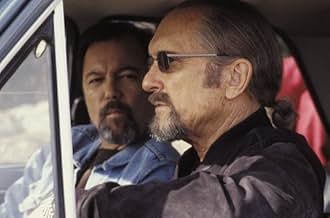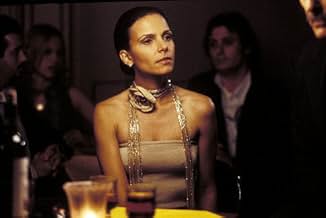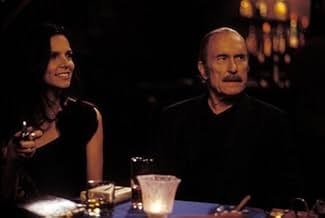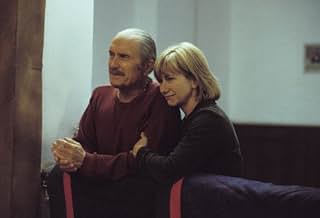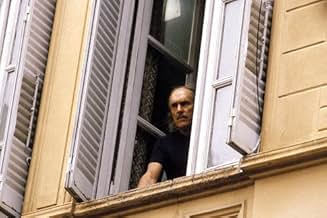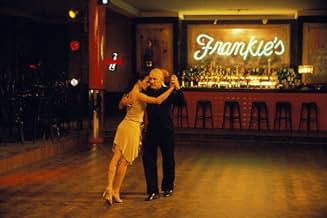AVALIAÇÃO DA IMDb
5,7/10
3,5 mil
SUA AVALIAÇÃO
Um assassino idoso consegue um contrato para matar um general em Buenos Aires, Argentina. Mas quando sua marca não está mais disponível, ele se envolve com a cultura do tango argentino.Um assassino idoso consegue um contrato para matar um general em Buenos Aires, Argentina. Mas quando sua marca não está mais disponível, ele se envolve com a cultura do tango argentino.Um assassino idoso consegue um contrato para matar um general em Buenos Aires, Argentina. Mas quando sua marca não está mais disponível, ele se envolve com a cultura do tango argentino.
- Prêmios
- 1 indicação no total
Avaliações em destaque
I'm a student of Robert Duvall's career. The films he has personally written and directed tend to to quirky and the subjects are those in which he has a strong interest. He has spent a fair amount of time in Argentina, and has a passionate interest in the Tango. His leading lady later became his wife. My suspicion is that Duvall made this movie out of love and could care less if it made money. The opaque nature of the assassination side of the story fits right in with Argentine political history. The Tango portion of the film is very well done, and shows his love of the dance. In any case, the movie is worth watching if you are a Duvall fan.
In `Assassination Tango,' a film for which he provided both script and direction, Robert Duvall plays an aging professional killer who also happens to be a tango aficionado. Like the gangsters in `The Godfather,' John J. Anderson is able to compartmentalize the morally contradictory elements of his life: he can gun down in cold blood a total stranger, while at the same time lavishing limitless love and affection on his girlfriend and the ten-year old `stepdaughter' whom he worships and adores. When he is sent to Buenos Aires to take out a disreputable retired general, John falls in love with both a lovely young dancer and the style of `genuine' tango dancing to which she introduces him.
`Assassination Tango,' despite the unsavory elements of the story, is a quiet, muted film that is more about this strangely paradoxical character than it is about either assassination or tango. John is a man who has kept his emotions pretty well in check his whole life and now, as he begins to see the end of that life coming, he feels the need to make some kind of meaningful connection with the people around him. What makes John interesting is the way in which Duvall has chosen to portray him. For the most part, John seems totally subdued in his mannerisms and tone of voice, but he often erupts unexpectedly in fits of uncontrolled mania and violence aimed more at objects like payphones or people who annoy him than at his carefully chosen victims, whom he liquidates with an emotional detachment worthy of his profession. Duvall hits all the right notes in making his character both frighteningly bizarre and strangely sympathetic all at the same time.
As a writer, Duvall does better with dialogue than with the narrative framework as a whole. Particularly effective is John's constantly asking the Argentineans with whom he's conversing to repeat what they have just said. Most writer/directors would not be shrewd enough to add this calculated bit of realism, which seems just right given the bilingual situation he has set up. Unfortunately, Duvall's considerably less successful with the story itself, which often wanders aimlessly, lacks clarity (particularly in the cloak-and-dagger sequences) and suffers from an overall failure to meld the various elements into a compelling whole. The supporting performers are all good, but, ultimately, we are left wondering just what Duvall had in mind when he set about making this film. If his purpose was to show that even coldhearted killers can love their kids and appreciate art and beauty, then that ground was pretty much covered by `The Godfather' movies. Even the tango scenes are generally blasé and uninspiring, forcing us to wonder just what it is about this dance that both intoxicates John and leads one of the women in the film to say that the tango is `life, love, hate,' an encomium that certainly doesn't seem justified by the dance sequences in this film.
`Assassination Tango' deserves to be seen for Duvall's performance and for the uniqueness of both its setting and its main character. Just don't expect to be swept off your feet by the dancing.
`Assassination Tango,' despite the unsavory elements of the story, is a quiet, muted film that is more about this strangely paradoxical character than it is about either assassination or tango. John is a man who has kept his emotions pretty well in check his whole life and now, as he begins to see the end of that life coming, he feels the need to make some kind of meaningful connection with the people around him. What makes John interesting is the way in which Duvall has chosen to portray him. For the most part, John seems totally subdued in his mannerisms and tone of voice, but he often erupts unexpectedly in fits of uncontrolled mania and violence aimed more at objects like payphones or people who annoy him than at his carefully chosen victims, whom he liquidates with an emotional detachment worthy of his profession. Duvall hits all the right notes in making his character both frighteningly bizarre and strangely sympathetic all at the same time.
As a writer, Duvall does better with dialogue than with the narrative framework as a whole. Particularly effective is John's constantly asking the Argentineans with whom he's conversing to repeat what they have just said. Most writer/directors would not be shrewd enough to add this calculated bit of realism, which seems just right given the bilingual situation he has set up. Unfortunately, Duvall's considerably less successful with the story itself, which often wanders aimlessly, lacks clarity (particularly in the cloak-and-dagger sequences) and suffers from an overall failure to meld the various elements into a compelling whole. The supporting performers are all good, but, ultimately, we are left wondering just what Duvall had in mind when he set about making this film. If his purpose was to show that even coldhearted killers can love their kids and appreciate art and beauty, then that ground was pretty much covered by `The Godfather' movies. Even the tango scenes are generally blasé and uninspiring, forcing us to wonder just what it is about this dance that both intoxicates John and leads one of the women in the film to say that the tango is `life, love, hate,' an encomium that certainly doesn't seem justified by the dance sequences in this film.
`Assassination Tango' deserves to be seen for Duvall's performance and for the uniqueness of both its setting and its main character. Just don't expect to be swept off your feet by the dancing.
I love this movie. Beautiful. Thank you. The cast, the scenes, the music, the story, the cinematography. Perfect. Total entertainment. The drama, the comedy, the dance, even the smells. Robert Duvall's name in a picture guarantees great value. I wish to see many more of these superb works from the director and all the actors, and other creators of this film. Here is another example of great American movie making. I also want to say thanks to Sundance to show this piece on TV, unfortunatelly there aren't any movie theaters that would show this and similar movies. I would recommend this to anyone who enjoys watching a movie with great acting, nice music, and not the usual boring plot.
I love Duvall as an actor but he should stick to acting. Assassin Tango gets lost in its' subplot, long and mundane sequences about the assassins relationship with an Argentinian tango dancer. It doesn't go anywhere and is seriously in need of editing. The main story, about a hit on an ex-general responsible for too many desaparacidos is better but pretty chopped up so the tension is lost. Duvall seemed to suffer from the Woody Allen syndrome, trying to reclaim his youth.
I love this film so much I bought it in DVD, and in the last three years have shown it to 1) my Argentine wife; 2) her adult children and their friends; 3)several of my Argentine friends, and 4) the cats (who have to watch it while I'm watching it). All except the last have -- to a person -- found it both completely believable and unremarkable in the sense of "yeah, so what's new?" in its verisimilitude. The film is just about as crazy as real life is in Argentina, and the police-overruling-police scene is just one example. The conversations in the tango joint about the tango and people and Argentina and life are all about as real as I've witnessed here myself.
The longer I'm here the more I realize how difficult it is to portray what Argentina is "really like," mainly because it isn't any one thing but a whole mishmash of cultural, historical, economic, and political things that career around in people's lives and their minds and their emotions continuously.
The only thing I can say for sure is that if you meet anyone -- even an Argentine -- who tells you Argentina and its life and culture are easy to explain, don't believe it.
Someone said living here is like living a Kafka novel, and sometimes it certainly can feel that way. Conspiracy theory as a way of life has been endemic here, as far as I can tell, since the country first got going. The rural-urban split is real -- the whole City of Buenos Aires votes completely differently from the rest of the country and it doesn't mean a whit of difference except that the federal government becomes even more reluctant to help the capital because its politics are so frequently played out on another planet. And I'm not sure I agree with other comments that Argentines have a big inferiority complex; I think it's more like a "confusion" complex, i.e., "Why don't these other people understand life the way I do?"
The film also reminds me a bit of Apochalypse Now in that you just sort of have to watch it -- many times, perhaps -- and realize at the end you're just about as confused as you were when you first saw it, so if you're like me, you accept that, live with it, and are happy to hear any new interpretations that might come along.
Finally, I believe that Argentina is not a comfortable place to live if you're not extremely familiarity with and experienced in living in paradox, confusion, and Isaiah Berlin's theory of "negative freedoms." Thank God, I love it. But I know many don't!
The longer I'm here the more I realize how difficult it is to portray what Argentina is "really like," mainly because it isn't any one thing but a whole mishmash of cultural, historical, economic, and political things that career around in people's lives and their minds and their emotions continuously.
The only thing I can say for sure is that if you meet anyone -- even an Argentine -- who tells you Argentina and its life and culture are easy to explain, don't believe it.
Someone said living here is like living a Kafka novel, and sometimes it certainly can feel that way. Conspiracy theory as a way of life has been endemic here, as far as I can tell, since the country first got going. The rural-urban split is real -- the whole City of Buenos Aires votes completely differently from the rest of the country and it doesn't mean a whit of difference except that the federal government becomes even more reluctant to help the capital because its politics are so frequently played out on another planet. And I'm not sure I agree with other comments that Argentines have a big inferiority complex; I think it's more like a "confusion" complex, i.e., "Why don't these other people understand life the way I do?"
The film also reminds me a bit of Apochalypse Now in that you just sort of have to watch it -- many times, perhaps -- and realize at the end you're just about as confused as you were when you first saw it, so if you're like me, you accept that, live with it, and are happy to hear any new interpretations that might come along.
Finally, I believe that Argentina is not a comfortable place to live if you're not extremely familiarity with and experienced in living in paradox, confusion, and Isaiah Berlin's theory of "negative freedoms." Thank God, I love it. But I know many don't!
Você sabia?
- CuriosidadesThis movie is Robert Duvall's tribute to tango, which is why he filmed it in Buenos Aires, Argentina, using many real tango dancers and authentic tango locations. Some of the tango celebrity faces you can spot include: Geraldine Rojas and Javiar Rodriguez (Pirucha, sister of Manuela and her first partner), Pablo Veron (Pirucha's final parter in the closing credits), Jorge Dispari and La Turca, Orlanda Paiva, Maria Nieves, Armando Orzuza, Carlos Copello, Alicia Monti, Los Hermanos Macana (two men performing a dance). The club with the checkerboard floor is Club Sin Rumbo, in the outskirt of the city, but a famous barrio for producing excellent tango dancers.
- ConexõesFeatured in MsMojo: Top 10 Tango Dance Scenes in Movies (2017)
Principais escolhas
Faça login para avaliar e ver a lista de recomendações personalizadas
- How long is Assassination Tango?Fornecido pela Alexa
Detalhes
- Data de lançamento
- Países de origem
- Central de atendimento oficial
- Idiomas
- Também conhecido como
- Assassination Tango
- Locações de filme
- Empresas de produção
- Consulte mais créditos da empresa na IMDbPro
Bilheteria
- Faturamento bruto nos EUA e Canadá
- US$ 1.013.272
- Fim de semana de estreia nos EUA e Canadá
- US$ 64.474
- 30 de mar. de 2003
- Faturamento bruto mundial
- US$ 1.013.272
- Tempo de duração
- 1 h 54 min(114 min)
- Cor
- Mixagem de som
- Proporção
- 1.85 : 1
Contribua para esta página
Sugerir uma alteração ou adicionar conteúdo ausente


